- Home
- E. F. Benson
Works of E F Benson Page 8
Works of E F Benson Read online
Page 8
“They give peace and blessing,” he said. “It is they who ordered that it should be so. Om!”
He seemed to sink into profound depths of meditation, and Lucia hurried back to the group she had left.
“It is all too wonderful,” she said. “The Guides have told him that they were settling everything for him in wisdom and love, so we may be sure we were right in our plans. How lovely to think that we have been guided by them! Dear Daisy, how wonderful he is! I will send across for his things, shall I, and I will have Hamlet and Othello made ready for him!”
Bitter though it was to part with her Guru, it was impious to rebel against the ordinances of the Guides, but there was a trace of human resentment in Daisy’s answer.
“Things!” she exclaimed. “He hasn’t got a thing in the world. Every material possession chains us down to earth. You will soon come to that, darling Lucia.”
It occurred to Georgie that the Guru had certainly got a bottle of brandy, but there was no use in introducing a topic that might lead to discord, and indeed, even as Lucia went indoors to see about Hamlet and Othello, the Guru himself having emerged from meditation, joined them and sat down by Mrs Quantock.
“Beloved lady,” he said, “all is peace and happiness. The Guides have spoken to me so lovingly of you, and they say it is best your Guru should come here. Perhaps I shall return later to your kind house. They smiled when I asked that. But just now they send me here: there is more need of me here, for already you have so much light.”
Certainly the Guides were very tactful people, for nothing could have soothed Mrs Quantock so effectually as a message of that kind, which she would certainly report to Lucia when she returned from seeing about Hamlet and Othello.
“Oh, do they say I have much light already, Guru, dear?” she asked. “That is nice of them.”
“Surely they said it, and now I shall go back to your house, and leave sweet thoughts there for you. And shall I send sweet thoughts to the home of the kind gentleman next door?”
Georgie eagerly welcomed this proposition, for with Hermy and Ursy coming that evening, he felt that he would have plenty of use for sweet thoughts. He even forebore to complete in his own mind the conjecture that was forming itself there, namely, that though the Guru would be leaving sweet thoughts for Mrs Quantock, he would probably be taking away the brandy bottle for himself. But Georgie knew he was only too apt to indulge in secret cynicisms and perhaps there was no brandy to take away by this time … and lo and behold, he was being cynical again.
The sun was still hot when, half an hour afterwards, he got into the open cab which he had ordered to take him to the station to meet Hermy and Ursy, and he put up his umbrella with its white linen cover, to shield him from it. He did not take the motor, because either Hermy or Ursy would have insisted on driving it, and he did not choose to put himself in their charge. In all the years that he had lived at Riseholme, he never remembered a time when social events— “work,” he called it — had been so exciting and varied. There were Hermy and Ursy coming this evening, and Olga Bracely and her husband (Olga Bracely and Mr Shuttleworth sounded vaguely improper: Georgie rather liked that) were coming tomorrow, and there was Lucia’s garden-party the day after, and every day there was to be a lesson from the Guru, so that God alone knew when Georgie would have a moment to himself for his embroidery or to practise the Mozart trio. But with his hair chestnut-coloured to the very roots, and his shining nails, and his comfortable boots, he felt extremely young and fit for anything. Soon, under the influence of the new creed with its postures and breathings, he would feel younger and more vigorous yet.
But he wished that it had been he who had found this pamphlet on Eastern philosophies, which had led Mrs Quantock to make the inquiries that had resulted in the epiphany of the Guru. Of course when once Lucia had heard about it, she was certain to constitute herself head and leader of the movement, and it was really remarkable how completely she had done that. In that meeting in the garden just now she had just sailed through Mrs Quantock as calmly as a steamer cuts through the waters of the sea, throwing her off from her penetrating bows like a spent wave. But baffled though she was for the moment, Georgie had been aware that Mrs Quantock seethed with revolutionary ideas: she deeply resented this confiscation of what was certainly her property, though she was impotent to stop it, and Georgie knew just what she felt. It was all very well to say that Lucia’s schemes were entirely in accord with the purposes of the Guides. That might be so, but Mrs Quantock would not cease to think that she had been robbed….
Yet nothing mattered if all the class found themselves getting young and active and loving and excellent under this tuition. It was that notion which had taken such entire command of them all, and for his part Georgie did not really care who owned the Guru, so to speak, if only he got the benefit of his teachings. For social purposes Lucia had annexed him, and doubtless with him in the house she could get little instructions and hints that would not count as a lesson, but after all, Georgie had still got Olga Bracely to himself, for he had not breathed a word of her advent to Lucia. He felt rather like one who, when revolutionary ideas are in the air, had concealed a revolver in his pocket. He did not formulate to himself precisely what he was going to do with it, but it gave him a sense of power to know it was there.
The train came in, but he looked in vain for his sisters. They had distinctly said they were arriving by it, but in a couple of minutes it was perfectly clear that they had done nothing of the kind, for the only person who got out was Mrs Weston’s cook, who as all the world knew went into Brinton every Wednesday to buy fish. At the rear of the train, however, was an immense quantity of luggage being taken out, which could not all be Mrs Weston’s fish, and indeed, even at that distance there was something familiar to Georgie about a very large green hold-all which was dumped there. Perhaps Hermy and Ursy had travelled in the van, because “it was such a lark,” or for some other tomboy reason, and he went down the platform to investigate. There were bags of golf clubs, and a dog, and portmanteaux, and even as the conviction dawned on him that he had seen some of these objects before, the guard, to whom Georgie always gave half-a-crown when he travelled by this train, presented him with a note scrawled in pencil. It ran —
“Dearest Georgie,
“It was such a lovely day that when we got to Paddington Ursy and I decided to bicycle down instead, so for a lark we sent our things on, and we may arrive tonight, but probably tomorrow. Take care of Tiptree: and give him plenty of jam. He loves it.
”Yours,
”HERMY.
“P.S. — Tipsipoozie doesn’t really bite: it’s only his fun.”
Georgie crumpled up this odious epistle, and became aware that Tipsipoozie, a lean Irish terrier, was regarding him with peculiar disfavour, and shewing all his teeth, probably in fun. In pursuance of this humorous idea, he then darted towards Georgie, and would have been extremely funny, if he had not been handicapped by the bag of golf-clubs to which he was tethered. As it was, he pursued him down the platform, towing the clubs after him, till he got entangled in them and fell down.
Georgie hated dogs at any time, though he had never hated one so much as Tipsipoozie, and the problems of life became more complicated than ever. Certainly he was not going to drive back with Tipsipoozie in his cab, and it became necessary to hire another for that abominable hound and the rest of the luggage. And what on earth was to happen when he arrived home, if Tipsipoozie did not drop his fun and become serious? Foljambe, it is true, liked dogs, so perhaps dogs liked her … “But it is most tarsome of Hermy!” thought Georgie bitterly. “I wonder what the Guru would do.” There ensued a very trying ten minutes, in which the station-master, the porters, Georgie and Mrs Weston’s maid all called Tipsipoozie a good dog as he lay on the ground snapping promiscuously at those who praised him. Eventually a valiant porter picked up the bag of clubs, and by holding them out in front of him at the extreme length of his arms, in the manner of a fishing rod, w
ith Tipsipoozie on a short chain at the other end of the bag, like a savage fish, cursing and swearing, managed to propel him into the cab, and there was another half-crown gone. Georgie thereupon got into his cab and sped homewards in order to arrive there first, and consult with Foljambe. Foljambe usually thought of something.
Foljambe came out at the noise of the arriving wheels and Georgie explained the absence of his sisters and the advent of an atrocious dog.
“He’s very fierce,” he said, “but he likes jam.”
Foljambe gave that supreme smile which sometimes Georgie resented. Now he hailed it, as if it was “an angel-face’s smile.”
“I’ll see to him, sir,” she said. “I’ve brought up your tea.”
“But you’ll take care, Foljambe won’t you?” he asked.
“I expect he’d better take care,” returned the intrepid woman.
Georgie, as he often said, trusted Foljambe completely, which must explain why he went into his drawing-room, shut the door, and looked out of the window when the second cab arrived. She opened the door, put her arms inside, and next moment emerged again with Tipsipoozie on the end of the chain, making extravagant exhibitions of delight. Then to Georgie’s horror, the drawing-room door opened, and in came Tipsipoozie without any chain at all. Rapidly sending a message of love in all directions like a S. O. S. call, Georgie put a small chair in front of him, to shield his legs. Tipsipoozie evidently thought it was a game, and hid behind the sofa to rush out again from ambush.
“Just got snappy being tied to those golf-clubs,” remarked Foljambe.
But Georgie, as he put some jam into his saucer, could not help wondering whether the message of love had not done it.
He dined alone, for Hermy and Ursy did not appear, and had a great polishing of his knick-knacks afterwards, while waiting for them. No one ever felt anxious at the non-arrival of those sisters, for they always turned up from their otter-hunting or their golf sooner or later, chiefly later, in the highest spirits at the larks they had had, with amazingly dirty hands and prodigious appetite. But when twelve o’clock struck, he decided to give up all idea of their appearance that night, and having given Tipsipoozie some more jam and a comfortable bed in the woodshed, he went upstairs to his room. Though he knew it was still possible that he might be roused by wild “Cooees!” and showers of gravel at his window, and have to come down and minister to their gross appetites, the prospect seemed improbable and he soon went to sleep.
Georgie awoke with a start some hours later, wondering what had disturbed him. There was no gravel rattling on his window, no violent ringing of bicycle bells, nor loud genial shouts outraging the decorous calm of Riseholme, but certainly he had heard something. Next moment, the repeated noise sent his heart leaping into his throat, for quite distinctly he heard a muffled sound in the room below, which he instantly diagnosed with fatal certainty as burglars. The first emotion that mingled itself with the sheer terror, was a passionate regret that Hermy and Ursy had not come. They would have thought it tremendous larks, and would have invented some wonderful offensive with fire-irons and golf-clubs and dumb-bells. Even Tipsipoozie, the lately-abhorred, would have been a succour in this crisis, and why, oh why, had not Georgie had him to sleep in his bedroom instead of making him cosy in the woodshed? He would have let Tipsipoozie sleep on his lovely blue quilt for the remainder of his days, if only Tipsipoozie could have been with him now, ready to have fun with the burglar below. As it was, the servants were in the attics at the top of the house, Dicky slept out, and Georgie was all alone, with the prospect of having to defend his property at risk of his life. Even at this moment, as he sat up in bed, blanched with terror, these miscreants might be putting his treasure into their pockets. The thought of the Faberge cigarette case, and the Louis XVI snuff box, and the Queen Anne toy-porringer which he had inherited all these years, made even life seem cheap, for life would be intolerable without them, and he sprang out of bed, groped for his slippers, since until he had made a plan it was wiser not to shew a light, and shuffled noiselessly towards the door.
CHAPTER SIX.
The door-handle felt icy to fingers already frozen with fright, but he stood firmly grasping it, ready to turn it noiselessly when he had quite made up his mind what to do. The first expedient that suggested itself with an overpowering sweetness of relief, was that of locking his door, going back to bed again, and pretending that he had heard nothing. But apart from the sheer cowardice of that, which he did not mind so much, as nobody else would ever know his guilt, the thought of the burglar going off quite unmolested with his property was intolerable. Even if he could not summon up enough courage to get downstairs with his life and a poker in his hand, he must at least give them a good fright. They had frightened him, and so he would frighten them. They should not have it all their own way, and if he decided not to attack them (or him) single-handed, he could at least thump on the floor, and call out “Burglars!” at the top of his voice, or shout “Charles! Henry! Thomas!” as if summoning a bevy of stalwart footmen. The objection to this course, however, would be that Foljambe or somebody else might hear him, and in this case, if he did not then go downstairs to mortal combat, the knowledge of his cowardice would be the property of others beside himself…. And all the time he hesitated, they were probably filling their pockets with his dearest possessions.
He tried to send out a message of love, but he was totally unable to do so.
Then the little clock in his mantelpiece struck two, which was a miserable hour, sundered so far from dawn.
Though he had lived through years of agony since he got out of bed, the actual passage of time, as he stood frozen to the door-handle, was but the duration of a few brief seconds, and then making a tremendous call on his courage he felt his way to his fireplace, and picked up the poker. The tongs and shovel rattled treacherously, and he hoped that had not been heard, for the essence of his plan (though he had yet no idea what that plan was) must be silence till some awful surprise broke upon them. If only he could summon the police, he could come rushing downstairs with his poker, as the professional supporters of the law gained an entrance to his house, but unfortunately the telephone was downstairs, and he could not reasonably hope to carry on a conversation with the police station without being overheard by the burglars.
He opened his door with so masterly a movement that there was no sound either from the hinges nor from the handle as he turned it, and peered out. The hall below was dark, but a long pencil of light came from the drawing room, which showed where the reckless brutes must be, and there, too, alas! was his case of treasures. Then suddenly he heard the sound of a voice, speaking very low, and another voice answered it. At that Georgie’s heart sank, for this proved that there must be at least two burglars, and the odds against him were desperate. After that came a low, cruel laugh, the unmistakable sound of the rattle of knives and forks, and the explosive uncorking of a bottle. At that his heart sank even lower yet, for he had read that cool habitual burglars always had supper before they got to work, and therefore he was about to deal with a gang of professionals. Also that explosive uncorking clearly indicated champagne, and he knew that they were feasting on his best. And how wicked of them to take their unhallowed meal in his drawing-room, for there was no proper table there, and they would be making a dreadful mess over everything.
A current of cool night air swept up the stairs, and Georgie saw the panel of light from the open drawing-room door diminish in width, and presently the door shut with a soft thud, leaving him in the dark. At that his desperation seemed pressed and concentrated into a moment of fictitious courage, for he unerringly reasoned that they had left the drawing-room window open, and that perhaps in a few moments now they would have finished their meal and with bulging pockets would step forth unchallenged into the night. Why had he never had bolts put on his shutters, like Mrs Weston, who lived in nightly terror of burglars? But it was too late to think of that now, for it was impossible to ask them to step out t
ill he had put bolts up, and then when he was ready begin again.
He could not let them go gorged with his champagne and laden with his treasures without reprisals of some sort, and keeping his thoughts steadily away from revolvers and clubs and sandbags, walked straight downstairs, threw open the drawing-room door, and with his poker grasped in his shaking hand, cried out in a faint, thin voice:
“If you move I shall fire.”
There was a moment of dead silence, and a little dazzled with the light he saw what faced him.
At opposite ends of his Chippendale sofa sat Hermy and Ursy. Hermy had her mouth open and held a bun in her dirty hands. Ursy had her mouth shut and her cheeks were bulging. Between them was a ham and a loaf of bread, and a pot of marmalade and a Stilton cheese, and on the floor was the bottle of champagne with two brimming bubbling tea cups full of wine. The cork and the wire and the tin-foil they had, with some show of decency, thrown into the fireplace.
Hermy put down her bun, and gave a great shout of laughter; Ursy’s mouth was disgustingly full and she exploded. Then they lay back against the arms of the sofa and howled.
Georgie was very much vexed.
“Upon my word, Hermy!” he said, and then found it was not nearly a strong enough expression. And in a moment of ungovernable irritation he said:
“Damn it all!”
Hermy showed signs of recovery first, and as Georgie came back after shutting the window, could find her voice, while Ursy collected small fragments of ham and bread which she had partially chewed.
“Lord! What a lark!” she said. “Georgie, it’s the most ripping lark.”
Ursy pointed to the poker.
“He’ll fire if we move,” she cried. “Or poke the fire, was it?”
“Ask another!” screamed Hermy. “Oh, dear, he thought we were burglars, and came down with a poker, brave boy! It’s positively the limit. Have a drink, Georgie.”

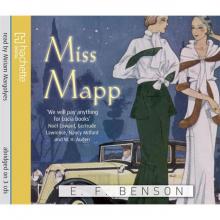 Miss Mapp
Miss Mapp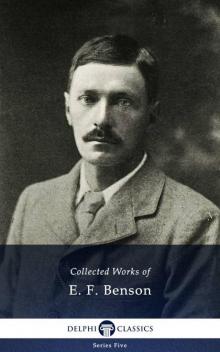 Works of E F Benson
Works of E F Benson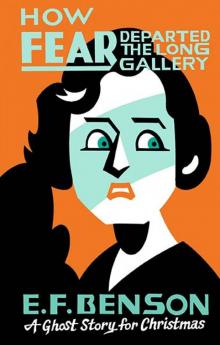 How Fear Departed the Long Gallery
How Fear Departed the Long Gallery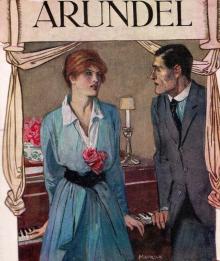 Dodo's Daughter: A Sequel to Dodo
Dodo's Daughter: A Sequel to Dodo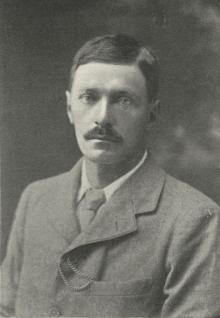 The House of Defence v. 1
The House of Defence v. 1 Queen Lucia
Queen Lucia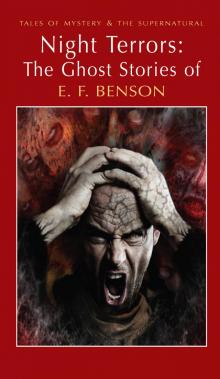 Night Terrors
Night Terrors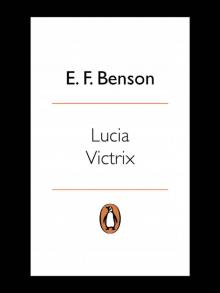 Lucia Victrix
Lucia Victrix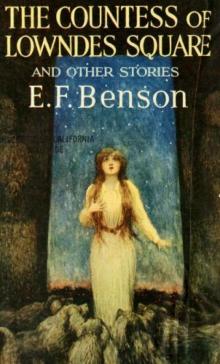 The Countess of Lowndes Square and Other Stories
The Countess of Lowndes Square and Other Stories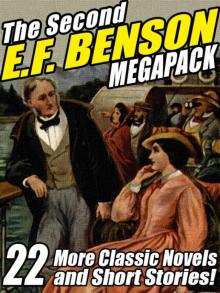 The Second E. F. Benson Megapack
The Second E. F. Benson Megapack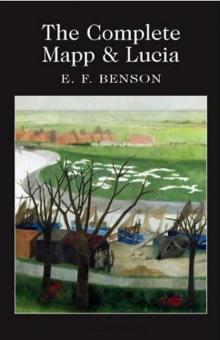 The Complete Mapp & Lucia
The Complete Mapp & Lucia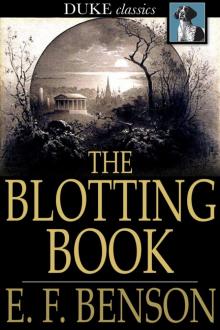 The Blotting Book
The Blotting Book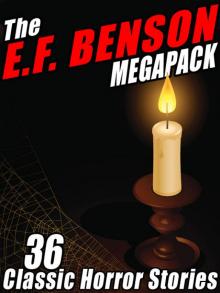 The E. F. Benson Megapack
The E. F. Benson Megapack Lucia Rising
Lucia Rising Ghost Stories
Ghost Stories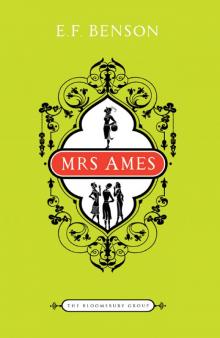 Mrs. Ames
Mrs. Ames E. F. Benson
E. F. Benson